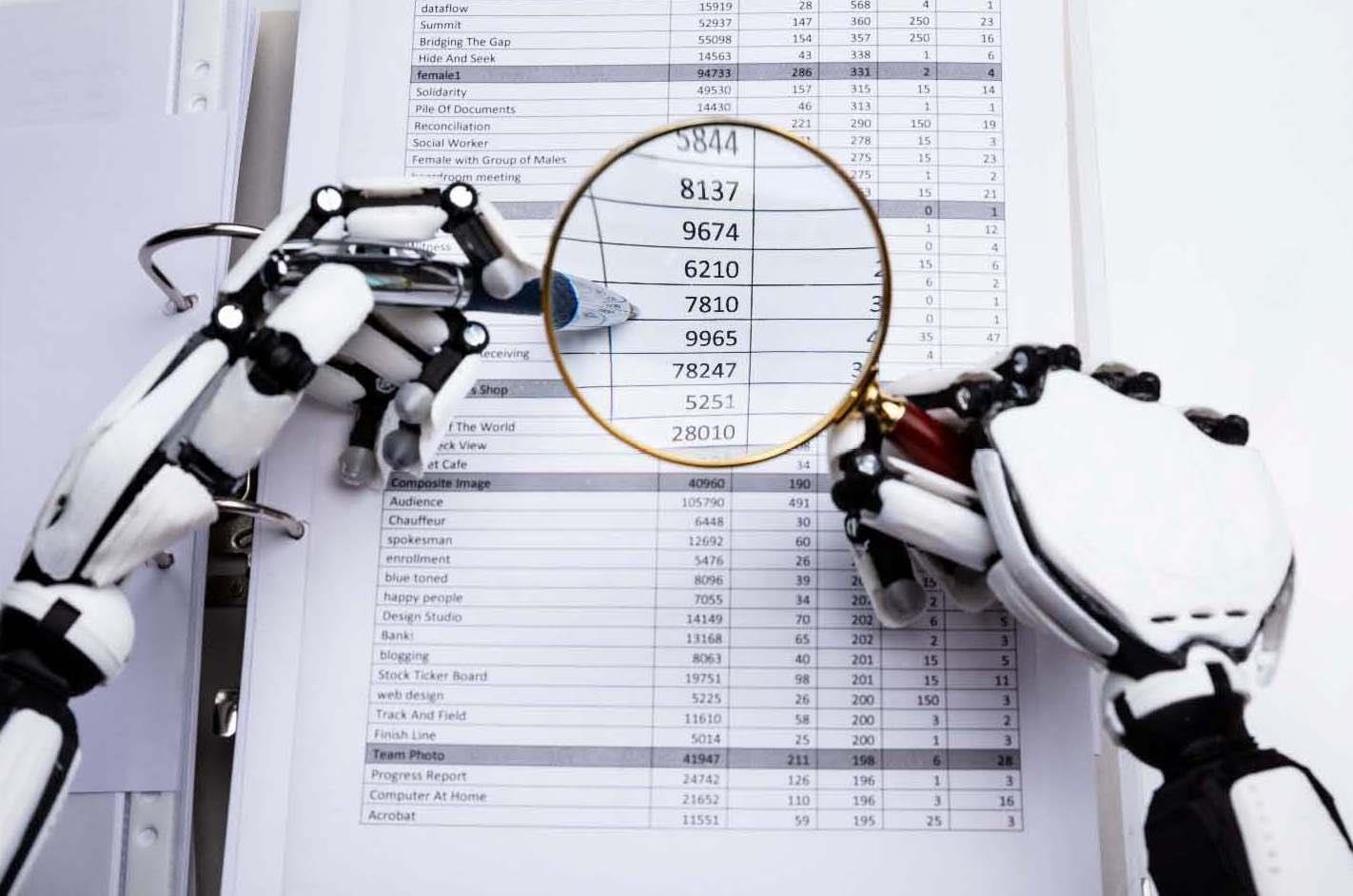
403
Sorry!!
Error! We're sorry, but the page you were looking for doesn't exist.
The Future Of Accounting: AI-Driven Account Reconciliation And Its Impact On Financial Accuracy
(MENAFN- ForPressRelease)
As the accounting landscape continues to evolve, one of the most significant transformations is the increasing reliance on AI-driven account reconciliation. In an era where financial data grows exponentially, businesses face new challenges in maintaining financial accuracy. With the rise of automation and advanced technology, AI is set to reshape accounting processes, improving the detection of discrepancies and ensuring more precise financial reporting.
In this article, we'll explore how AI-driven account reconciliation is transforming the accounting industry, its key benefits, and why it's essential for organizations aiming for financial accuracy and long-term success.
The Data Explosion: A Growing Challenge for Accountants
The volume of financial data is growing at an unprecedented rate. With businesses handling thousands, if not millions, of transactions daily, managing this massive amount of data presents a critical challenge for accounting teams. Traditional methods of reconciling accounts and identifying discrepancies are increasingly inadequate in this data-driven world.
Accounting teams are now tasked with handling vast amounts of financial information, from invoices and payments to tax records and financial reports. The manual review of this data is prone to errors, time-consuming, and lacks the scalability needed to keep up with the modern pace of business. This is where autonomous management comes into play.
Understanding AI-Driven Reconciliation
AI-driven account reconciliation leverages machine learning algorithms to analyze vast datasets, detect unusual patterns and predict potential discrepancies and anomalies before they escalate into significant issues. Unlike rule-based systems, which require manual setup of specific conditions, AI models can automatically learn from historical data and continuously adapt to new patterns and trends.
In the realm of accounting, this means AI can detect unusual transactions, errors in financial statements, or any outliers that deviate from expected norms. These systems don't just flag anomalies, they offer context and actionable insights, helping accounting teams make informed decisions quickly.
For example, autonomous accounting uses AI to scan financial data in real time, identifying anomalies like duplicate invoices, incorrect payments, or potential fraud indicators. The system can process vast amounts of data faster than any human team, ensuring that discrepancies are caught and resolved before they become significant issues.
Key Benefits of AI-Driven Reconciliation
AI-driven account reconciliation software offers several critical benefits that improve financial accuracy, reduce risk, and enhance overall operational efficiency. Let's learn about some of the main advantages:
Real-Time Detection and Reporting
AI-powered tools operate 24/7, constantly monitoring financial transactions and providing real-time alerts for any anomalies. This immediate detection reduces the lag between when an error occurs and when it is addressed, allowing accounting teams to take corrective actions promptly.
Reduced Human Error
In the manual accounting processes, the chances of mistakes are very high, particularly when datasets are quite large. AI is capable of eliminating the chances of human error with the automation of routine tasks, such as data entry, manual calculation, reconciliation, and anomaly detection. As a result, accounting teams can focus on higher-level tasks, like strategic planning and financial analysis.
Improved Fraud Detection
Financial fraud is a growing concern, costing businesses billions of dollars annually. AI systems are adept at detecting suspicious activities, such as unusual spending patterns or unauthorized transactions. By continuously learning from new data, AI can recognize fraudulent activities that traditional rule-based systems might miss.
Enhanced Compliance and Audit Readiness
With regulatory requirements becoming more stringent, businesses must ensure their financial records are accurate and compliant. Automated reconciliation helps ensure that all transactions meet compliance standards, reducing the risk of regulatory fines and audit failures. Moreover, these systems can generate audit trails, making it easier for organizations to prepare for internal or external audits.
Scalability and Efficiency
AI-powered systems are highly scalable, meaning they can handle growing volumes of financial data without requiring additional resources. This makes them ideal for businesses that are expanding or experiencing increased transaction volume. AI can process and analyze large datasets at a fraction of the time it would take humans, improving operational efficiency and allowing accounting teams to operate at scale.
The Role of AI in Enhancing Financial Accuracy
AI doesn't just detect anomalies, it actively improves financial accuracy. By continuously monitoring and learning from transactional data, AI tools can identify patterns and trends that might indicate systemic issues, allowing organizations to correct them before they cause significant financial harm.
This predictive capability is crucial, especially for large enterprises where small inaccuracies can lead to substantial financial discrepancies over time. AI-driven tools ensure that accounting teams can maintain a high level of accuracy, even when dealing with complex, multi-channel financial systems.
AI-Driven Account Reconciliation: The Future of Accounting
The future of accounting lies in artificial intelligence and automation. Since AI is evolving everyday, it will continue to impact financial accuracy in a more significant manner. Companies that fail to adopt AI-driven account reconciliation risk falling behind, as manual processes become increasingly inefficient and error-prone in the face of growing data complexity.
Forward-thinking organizations are already leveraging AI to streamline their financial processes, reduce risks, and gain a competitive edge in the marketplace. By integrating AI-driven reconciliation tools, businesses can future-proof their accounting operations and ensure sustained financial accuracy.
Conclusion
Automated reconciliation is not just a process for improving financial accuracy, it's a game changer for the entire accounting industry. With the ability to analyze large datasets in real time, detect irregularities, and predict potential issues, AI is changing how businesses manage their financial data. By reducing human error, enhancing compliance, and providing real-time insights, AI is helping organizations stay ahead of the curve in today's fast-paced financial environment.
As businesses continue to navigate the complexities of modern finance, AI will play an increasingly critical role in ensuring accuracy, reducing risk, and driving operational efficiency. For organizations looking to stay competitive, investing in AI-driven financial solutions like autonomous accounting software is no longer an option, but a necessity for the future.
In this article, we'll explore how AI-driven account reconciliation is transforming the accounting industry, its key benefits, and why it's essential for organizations aiming for financial accuracy and long-term success.
The Data Explosion: A Growing Challenge for Accountants
The volume of financial data is growing at an unprecedented rate. With businesses handling thousands, if not millions, of transactions daily, managing this massive amount of data presents a critical challenge for accounting teams. Traditional methods of reconciling accounts and identifying discrepancies are increasingly inadequate in this data-driven world.
Accounting teams are now tasked with handling vast amounts of financial information, from invoices and payments to tax records and financial reports. The manual review of this data is prone to errors, time-consuming, and lacks the scalability needed to keep up with the modern pace of business. This is where autonomous management comes into play.
Understanding AI-Driven Reconciliation
AI-driven account reconciliation leverages machine learning algorithms to analyze vast datasets, detect unusual patterns and predict potential discrepancies and anomalies before they escalate into significant issues. Unlike rule-based systems, which require manual setup of specific conditions, AI models can automatically learn from historical data and continuously adapt to new patterns and trends.
In the realm of accounting, this means AI can detect unusual transactions, errors in financial statements, or any outliers that deviate from expected norms. These systems don't just flag anomalies, they offer context and actionable insights, helping accounting teams make informed decisions quickly.
For example, autonomous accounting uses AI to scan financial data in real time, identifying anomalies like duplicate invoices, incorrect payments, or potential fraud indicators. The system can process vast amounts of data faster than any human team, ensuring that discrepancies are caught and resolved before they become significant issues.
Key Benefits of AI-Driven Reconciliation
AI-driven account reconciliation software offers several critical benefits that improve financial accuracy, reduce risk, and enhance overall operational efficiency. Let's learn about some of the main advantages:
Real-Time Detection and Reporting
AI-powered tools operate 24/7, constantly monitoring financial transactions and providing real-time alerts for any anomalies. This immediate detection reduces the lag between when an error occurs and when it is addressed, allowing accounting teams to take corrective actions promptly.
Reduced Human Error
In the manual accounting processes, the chances of mistakes are very high, particularly when datasets are quite large. AI is capable of eliminating the chances of human error with the automation of routine tasks, such as data entry, manual calculation, reconciliation, and anomaly detection. As a result, accounting teams can focus on higher-level tasks, like strategic planning and financial analysis.
Improved Fraud Detection
Financial fraud is a growing concern, costing businesses billions of dollars annually. AI systems are adept at detecting suspicious activities, such as unusual spending patterns or unauthorized transactions. By continuously learning from new data, AI can recognize fraudulent activities that traditional rule-based systems might miss.
Enhanced Compliance and Audit Readiness
With regulatory requirements becoming more stringent, businesses must ensure their financial records are accurate and compliant. Automated reconciliation helps ensure that all transactions meet compliance standards, reducing the risk of regulatory fines and audit failures. Moreover, these systems can generate audit trails, making it easier for organizations to prepare for internal or external audits.
Scalability and Efficiency
AI-powered systems are highly scalable, meaning they can handle growing volumes of financial data without requiring additional resources. This makes them ideal for businesses that are expanding or experiencing increased transaction volume. AI can process and analyze large datasets at a fraction of the time it would take humans, improving operational efficiency and allowing accounting teams to operate at scale.
The Role of AI in Enhancing Financial Accuracy
AI doesn't just detect anomalies, it actively improves financial accuracy. By continuously monitoring and learning from transactional data, AI tools can identify patterns and trends that might indicate systemic issues, allowing organizations to correct them before they cause significant financial harm.
This predictive capability is crucial, especially for large enterprises where small inaccuracies can lead to substantial financial discrepancies over time. AI-driven tools ensure that accounting teams can maintain a high level of accuracy, even when dealing with complex, multi-channel financial systems.
AI-Driven Account Reconciliation: The Future of Accounting
The future of accounting lies in artificial intelligence and automation. Since AI is evolving everyday, it will continue to impact financial accuracy in a more significant manner. Companies that fail to adopt AI-driven account reconciliation risk falling behind, as manual processes become increasingly inefficient and error-prone in the face of growing data complexity.
Forward-thinking organizations are already leveraging AI to streamline their financial processes, reduce risks, and gain a competitive edge in the marketplace. By integrating AI-driven reconciliation tools, businesses can future-proof their accounting operations and ensure sustained financial accuracy.
Conclusion
Automated reconciliation is not just a process for improving financial accuracy, it's a game changer for the entire accounting industry. With the ability to analyze large datasets in real time, detect irregularities, and predict potential issues, AI is changing how businesses manage their financial data. By reducing human error, enhancing compliance, and providing real-time insights, AI is helping organizations stay ahead of the curve in today's fast-paced financial environment.
As businesses continue to navigate the complexities of modern finance, AI will play an increasingly critical role in ensuring accuracy, reducing risk, and driving operational efficiency. For organizations looking to stay competitive, investing in AI-driven financial solutions like autonomous accounting software is no longer an option, but a necessity for the future.

Legal Disclaimer:
MENAFN provides the
information “as is” without warranty of any kind. We do not accept
any responsibility or liability for the accuracy, content, images,
videos, licenses, completeness, legality, or reliability of the information
contained in this article. If you have any complaints or copyright
issues related to this article, kindly contact the provider above.


















Comments
No comment